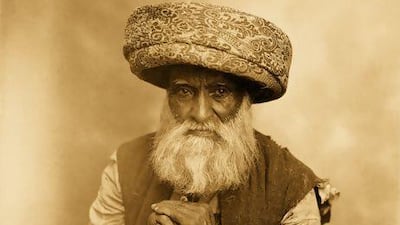The year is 1876 and Charles Doughty is about to set out, on a camel, from Damascus. When a pasha asks him where is going, he says: "To Tayma, Ha'il, I hope also to Khaybar." Dangerous areas in the desert wilderness, thousands of kilometres away in today's Saudi Arabia, that even the Bedu found tough, let alone an Englishman with dreams of writing an epic book. So it's no surprise to learn what happens next. "The pasha answered gravely 'Insha Allah'," writes Doughty, "doubtless his thought was that I might very hardly return from this Arabian adventure."
In the event, Doughty returned after 21 months of great hardship and peril, "half blinded, the scorched skin cracked to the quick upon my face". He'd in fact made it to Jeddah, almost 3,000km away. And, finally, a decade after he first got on that camel, Travels in Arabia Deserta was published. Initially, its effect was minimal. But it wasn't long before none other than TE Lawrence "of Arabia" was hailing Doughty as an inspiration and guide, calling his book "the first and indispensable work upon the Arabs of the desert".
It has since come to be regarded as one of the finest pieces of travel writing of its time. And after going in and out of print - it's also available to read online - the Folio Society in the UK has published a sumptuous collector's edition, featuring photographs, original drawings and a map drafted by Doughty himself. The map alone gives some idea of the incredible journey he undertook.
In this new edition, there is a preface by Rory Stewart - who is better qualified than most to understand the trials and tribulations of such a journey. In 2005 he won the Ondaatje Prize for his travel book The Places in Between, which chronicled his solo walk from Herat to Kabul in Afghanistan, in the middle of winter, just as the coalition invasion of the country had begun. In a chilling echo of the pasha's warnings to Doughty, an Afghan official tells Stewart: "You will die, I can guarantee."
And yet Stewart still finds it difficult to understand why Doughty undertook his adventure in the first place. "Right at the beginning somebody asks him about his motivations," he says. "But he never actually answers the question. I wonder sometimes whether he was looking for a very extreme experience to create a book. He wanted to write a great work of literature and thought that this was the way to find an environment in which to do so."
But if that sounds contrived, once Doughty was living among the Bedu the story takes on a life of its own. Most 19th-century travel books - in fact, most 21st-century ones, too - tend to move quite quickly as writers describe a new town or a stunning vista. But Travels in Arabia Deserta unfolds at an altogether slower pace.
"To take the time to patiently describe what it's like to live alongside the Bedu in the middle of nowhere is actually rather revolutionary - he's an anthropologist before his time," says Stewart. "In fact, I see him as rather a modern figure - he was trying to live a much purer, more isolated life. He's a hippy, in a way."
And yet Stewart freely admits that, initially at least, he found Travels in Arabia Deserta "difficult to bear" - Doughty is almost aggressive in his desire to revive a late medieval style of English which, like Shakespeare, takes some getting used to. He seems openly prejudiced about the people he meets and offends people when he refuses to pray five times a day.
"But he's honest about all that, at least," says Stewart. "And the theme of the book is actually that the heroes are the Arabs. At a time where there's no government, state, police force or army, here is a total stranger who has no permission to be in these places but is picked up, looked after, fed and protected out of gentleness and pity. They show huge sensitivity and compassion towards him."
It meant Travels in Arabia Deserta ended up being a unique chronicle of a piece of history that has been lost. Doughty's total immersion into Bedu society allows him to understand and describe, as Stewart puts it, "how a camel chews on a spring evening, or the ways in which different sheikhs serve coffee".
"You know, there will be people in the Emirates - and certainly in Saudi - who will have connections to the people Doughty refers to in his book," says Stewart. "We're not that far away from him. But their world changed completely, and very quickly. These very proud sheikhs were living very sparse lives in simple tents. But within a generation or two they find that the land they're living on is rich with oil. That's why anyone interested in Arab custom should read this book."
- For more pictures, visit www.thenational.ae/multimedia
- The Folio Society limited edition of Travels in Arabia Deserta by CM Doughty with a preface by Rory Stewart and introduction by TE Lawrence, printed on wove paper and plates printed on silk art paper, limited to 780 copies, is available at www.foliosociety.com priced £495 (Dh2,832)

